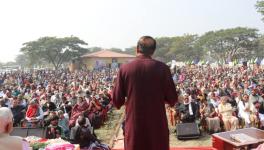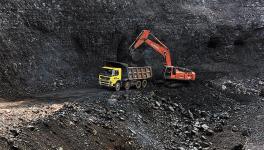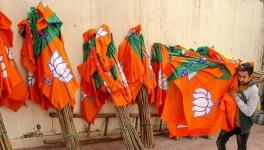Black Diamond Workers Stare at Dark Future on Coal Miners Day
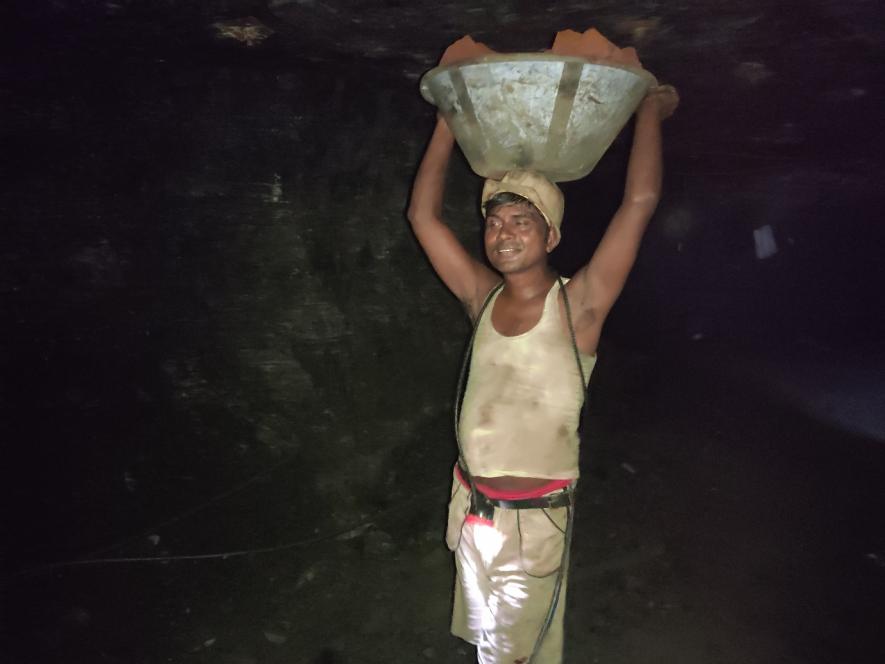
Rajib Mondal carries mud and bricks at Khottadih Colliery, in the Pandaveswar area of Paschim Bardhaman, West Bengal. (Pics: Saurav Kumar).
Coal, also known as the ‘Black Diamond’ in coalfields of eastern India, is mined by workers risking their lives. Ironically, as India marks Coal Miners Day on May 4, colliery workers remain the most unrecognised despite digging, hammering, screwing and shelving coal pits in precarious conditions.
Rajib Mondal (38) a loader employed at Khottadih Colliery, in the Pandaveswar area of Paschim Bardhaman, West Bengal, has a daily routine. With a light hanging by his waist to find his way in the dark, he transports mud to fill holes in the mine after excavation to ensure no further digging.
Mondal’s mining story goes back to 2013 when he joined an opencast coal mine (OCM) three km north of Khottadih Colliery as a contractual labourer to load and unload broken coal pieces for miscellaneous use manually.
LIFE UNDER SHADOW OF DEATH
Unlike miners in OCMs, workers in underground coal mines (UCMs) risk their lives.
Raju Paswan (35), who handles a big driller and transports brick and mud to seal holes along with 430 others, fears for his life after witnessing the death of a worker in 2019 when a part of the overhead coal surface collapsed on him.
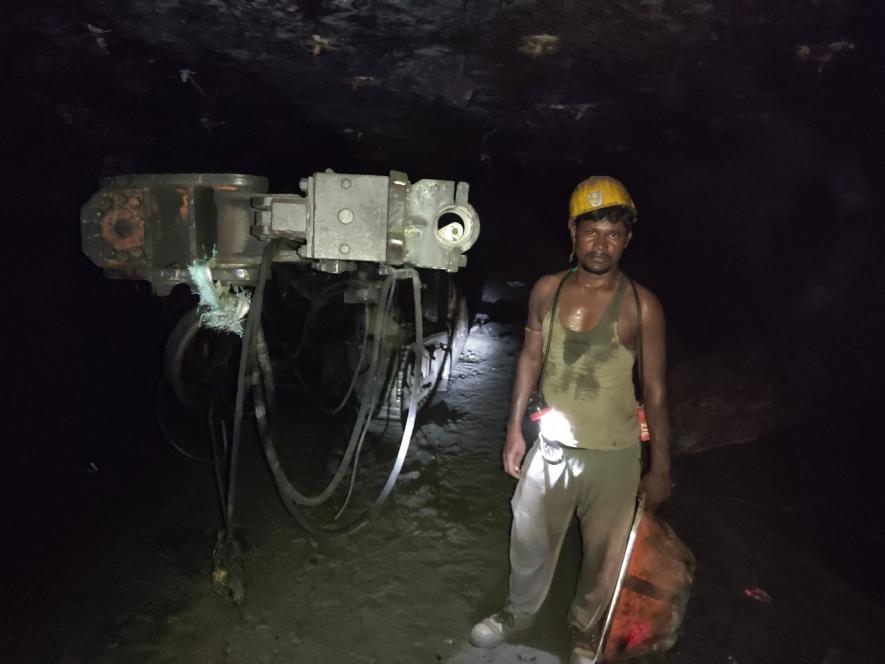
Hewer Raju Paswan works in constant fear of death.
“One day, a senior engineer directed six workers (including me) were asked to seal an overhead coal surface marked as the end-point of excavation. A small portion of it suddenly fell on a worker who died. It was my first encounter with death in a coal mine,” he says.
After the incident, Raju presumed every working day could be his last. “I have told my family not to worry about me as it’s the only option to earn a livelihood,” he adds expressing his apprehensions.
Being a UCM contractual worker fetches him a little more money than his OCM colleagues—but at the constant risk of death.
Rakesh Kumar, deputed to oversee work in the underground mine, admits that working hundreds of feet below is risky.
There are six collieries in Pandaveswar—Dalurband, Khottadih, Madhaipur, Manderbony, Pandaveswar and South Samla—out of which Khottadih has both an open cast project with a capacity of 2.20 metric tonnes (MT) per annum and an underground project of 0.90 MT.
FEAR OF MINE CLOSURE
Amid the government’s Just Transition From Coal programme, which aims to phase down coal production and ultimately close mines to switch to clean energy, permanent workers fear the colliery will be closed.
“We are yet to hear anything about clean energy and coal mine decommissioning from our Eastern Coalfields Limited,” says Rameshwar Kumar (55) adding, “They will soon inform us.”
Rameshwar Kumar fears that the colliery would be shut under the Just Transition From Coal programme.
Rameshwar hints at neighbouring Jharkhand’s Bharat Coking Coal Limited, a Coal India Limited subsidiary, which has started operating on the line of Just Transition.
“A large section of workers remain unaware of the government’s plan of decommissioning coal mines under Just Transition. In the long run, coal mine closure will adversely impact the local market, informal workers and small businesses around mines. It may create economic distress for many,” adds Rameshwar.
Although the government is taking steps towards clean energy, India plans to double its annual mining production to about one billion tonnes by 2025, according to the International Energy Agency.
UNCERTAIN LIVELIHOOD
West Bengal, which produces 31.67 billion tonnes of coal annually, is home to 11% of the country’s coal reserves. But women employed in the fourth largest coal reservoir have an uncertain future.
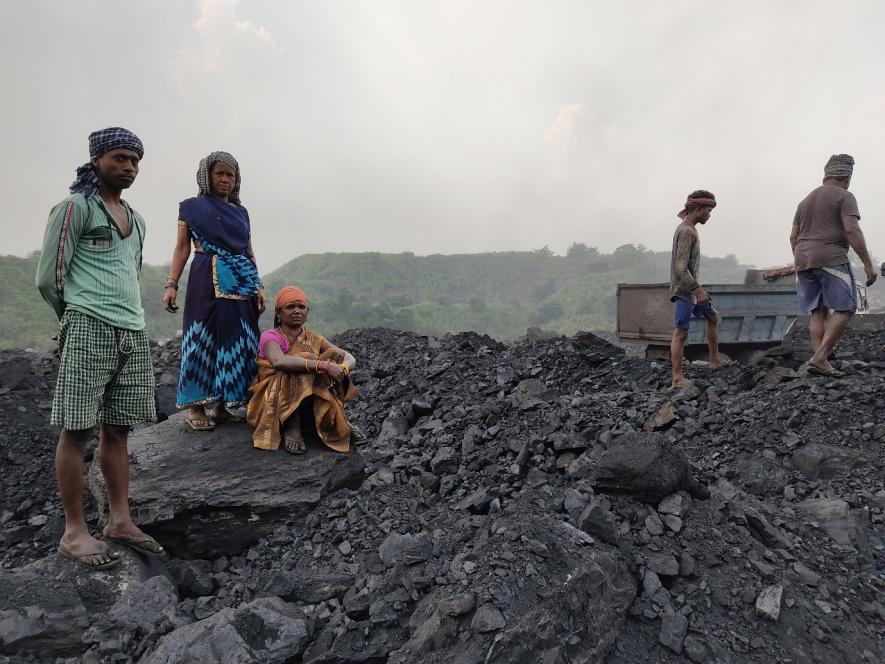
Manju Bouri sits on a heap of coal in the opencast mine.
Manju Bouri (39) segregates good-quality coal, which is transported to thermal power plants. “I got the job with the help of my younger brother Arun, who is a contractual worker in Khottadih Colliery.”
Unfortunately, Arun (30) had joined a graduate course at a government college but was compelled to work at the OCM after their father’s sudden death. He earns Rs 450 daily but lacks the social security benefits available to permanent employees.
Hearing the speculation of mine closure in the coming years shocked him. “We are smeared in coal dust daily to run our families. But if the mine shuts down, we will be unable to survive. Permanent employees have back-up benefits but we don’t.”
The writer is a freelance journalist.
Get the latest reports & analysis with people's perspective on Protests, movements & deep analytical videos, discussions of the current affairs in your Telegram app. Subscribe to NewsClick's Telegram channel & get Real-Time updates on stories, as they get published on our website.









